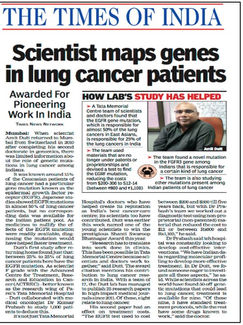
Professor and Tata Innovation Fellow
Department of Genetics (Biotech Centre),
University of Delhi South Campus,
Benito Juarez Marg, New Delhi-110021.
Ph: +91-11-24117399
Email: amitdutt [@]south.du.ac.in
Twitter: amtdutt
Integrated Cancer Genomics Lab
Our lab investigates the somatic landscape of human cancers, particularly focusing on the genomic underpinnings of oncogenesis and progression in lung, breast, cervical, gallbladder, head and neck, and other malignancies. This deeper understanding of cancer's genetic drivers across diverse tissues holds the potential to inform broader therapeutic strategies and ultimately improve clinical outcomes for a wider range of cancer patients. Utilizing cutting-edge sequencing technologies and rigorous functional validation, we aim to uncover novel therapeutic vulnerabilities within these cancers. Our ultimate goal is to translate these discoveries into next-generation targeted therapies, significantly enhancing clinical outcomes and offering renewed hope for cancer patients across a broad range of malignancies. Amit Dutt Lab
Functional Genomics:
Our genome-discovery efforts are paired with functional validation using biochemical, molecular, and cell-based experimental approaches, including in-house xenograft-orthotopic mouse models. We perturb candidate target genes with the CRISPR-Cas system and perform genome-wide pooled shRNA screens on tumor-derived cell lines to validate our genomic findings. Our research specifically focuses on novel resistance mechanisms against targeted and endocrine therapies in lung and breast cancers. Recently, we identified a novel fusion transcript, UBE3C-LRP5, found in 1.3% of Caucasian and 5.6% of Indian tongue cancer patients. Further in-depth characterization of this fusion transcript is underway.
Microbes and Cancer:
We are intrigued by the emerging link between microbes and various cancers. We developed HPVDetector, a tool used by over 400 researchers globally. Using this tool, our study revealed that tobacco use predominates over HPV infection in oral cancers in India and that UV damage is the key factor in Indian Merkel cell carcinoma patients, rather than viral infection. We also found a non-typhoidal Salmonella association with gallbladder cancer. More recently, our study revealed an association of Fusobacterium in head and neck tumors. We are now intensely studying how the spatio-localization of Fusobacterium impacts oral cancer progression, underscoring the clinical relevance of microbial influences on cancer.
Genome driven Discovery:
We analyze genome-wide alterations in the cancer genome, including point mutations, structural changes, and aberrant transcript fusions and expressions. We have developed robust, automated computational pipelines and tools, such as Waterhose, ClinOme, TMC-SNPdb, HPV Detector, DepRanker, RVD, COVID qPCR Analyzer, and Infectious Pathogen Detector, to handle high-throughput datasets from whole exome, transcriptome, and genome sequencing. Our latest tool, DOME, identifies rare cancer mutations. These innovations enable a comprehensive understanding of cancer's genetic foundations, guiding the development of novel therapeutic interventions, and others. Development of additional tools for neo-antigens and pan-cancer genome analysis is underway.

Dhananjay, Shailesh, Deepak, Ashwin, Aniket, Dr. Amit Dutt, Duleswar, Akshita, Archana, Akshay, Deepika, Siddhi, Sourabh, Supriya, Rudransh, Ganesh, Gourav


#fun_shall_never_end

Dhananjay, Shailesh, Deepak, Ashwin, Aniket, Dr. Amit Dutt, Duleswar, Akshita, Archana, Akshay, Deepika, Siddhi, Sourabh, Supriya, Rudransh, Ganesh, Gourav




















































